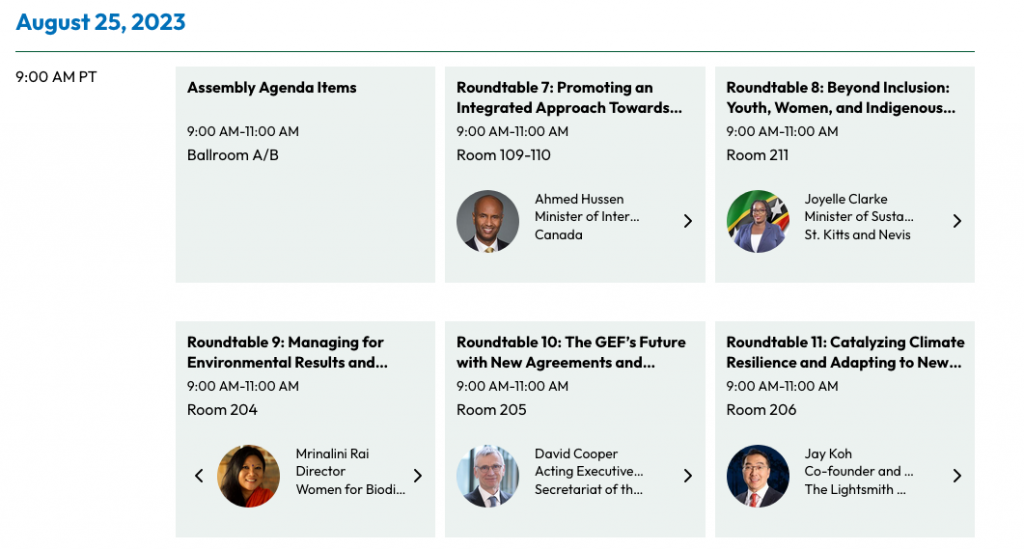The global call to action for environmental conservation and the restoration of our planet’s health has never been more urgent. At the 7th Global Environment Facility (GEF) Assembly, two parallel roundtable discussions were held on 25 August 2023 where significant insights were discussed into this complex and multi-faceted issue. Mrinalini Rai represented Women4Biodiversity in one of the roundtable discussions titled, “Managing for Environmental Results and Transformational Change”.
The panel consisted of the below,
- John Donaldson, GEF Scientific and Technical Advisory Panel (STAP) Member (moderator)
- George Heyman, Minister of Environment & Climate Change, British Colombia, Canada
- Ibrahim Thiaw, Executive Secretary, United Nations Convention to Combat Desertification (UNCCD)
- Jyotsna Puri, Associate Vice President, Strategy & Knowledge, International Fund for Agricultural Development (IFAD)
- Kwaku Afriyie, Minister of Environment, Science, Technology, and Innovation, Ghana
- Mrinalini Rai, Women4Biodiversity, Thailand, Director
The global goals set for our planet’s well-being have triggered an earnest exploration into novel approaches for amplifying and fast-tracking the impact. Both GEF and participating countries are now delving into methodologies to fortify data infrastructure and enhance implementation. The central focus here is on the role of international conventions, active measures by individual countries, and the pivotal support of international financing institutions.
The Intersection of Gender Equality and Data
A riveting segment of the roundtable discussion revolved around the link between data and gender equality. Mrinalini Rai was queried about the degree to which community actions led by women are based on data.
Rai emphasized the significance of data-driven gender equality as a foundation for a more inclusive society. Both quantitative and qualitative data sources have witnessed a surge. While quantitative metrics offer hard evidence of gender-based discrepancies, qualitative insights shed light on the personal experiences of those affected by gender inequality.
To illustrate, in 2015, data from Environment and Gender Information by IUCN showed that women led only 12% of 881 national environmental ministries across 193 countries. Fast forward to 2021, the progress is palpable but scanty, with a modest rise to 15%.
Rai further expanded on her answer by providing examples of Women4Biodiversity’s pilot restoration projects and also sharing their social, economic and cultural situations. For example: The total mangrove forest area for sustainable use in Costa Rica, one of the pilot restoration sites, is 15,800 hectares.
By analyzing both quantitative and qualitative data, organisations can develop more effective strategies to promote equality in all areas of life. Furthermore, this data can help to raise awareness of gender-based disparities and encourage individuals and organizations to take action to address them.
Power of Partnerships
When quizzed about partnerships essential for promoting evidence-backed actions for environmental targets, Rai accentuated the role of women and local organizations. Often sidelined in discussions, these entities bring a wealth of ground-level insights as women carry a strong sense of responsibility towards preserving the environment for future generations. Women can propel multi-stakeholder partnerships, and bring together governments, donors, and local communities for innovative solutions and impactful policy implementations.
Key Takeaways
In conclusion, the discussions were enriched with insights from global leaders such as George Heyman, Ibrahim Thiaw, Jyotsna Puri, and Kwaku Afriyie along with Mrinalini Rai.
The panellists were posed with a significant question: the core message they would like the audience to absorb. A resonating theme was the indispensability of women in biodiversity conservation. Women, intrinsically tied to their communities, bring a unique understanding of local challenges and needs. Their innate responsibility towards the environment ensures that conservation efforts are not only effective but sustainable. Empowering women in this sphere promises improved livelihoods, enhanced incomes, and recognition of their pivotal role in preserving the planet.
In essence, the intertwining of data and gender equality, reinforced by strategic partnerships, holds the key to a sustainable, biodiverse future. The call to action is clear: embrace data, empower women, and champion collaborations. The planet’s future depends on it.



